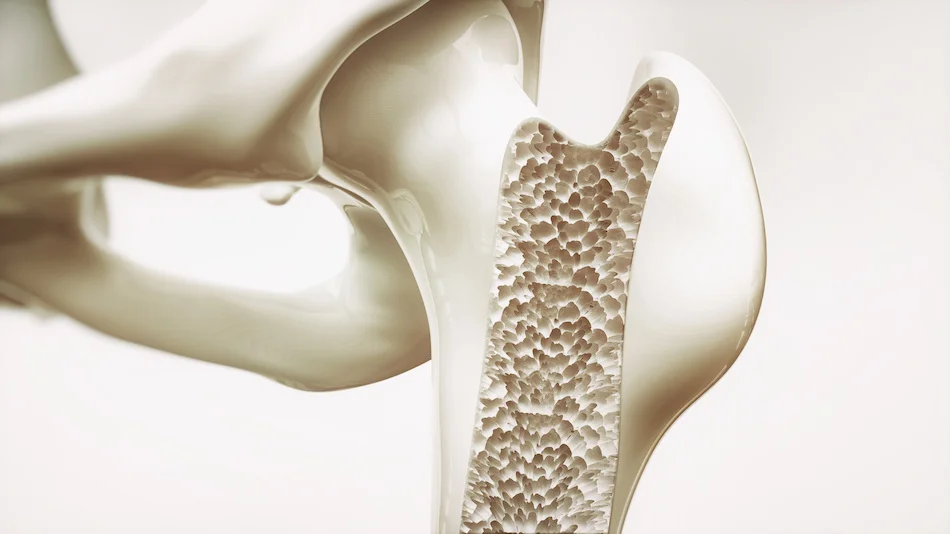How poor diet and lifestyle leach calcium from your bones
A diet lacking in whole foods combined with a stressful lifestyle creates acidity in your body, which it rectifies by pulling calcium from your bones, possibly leading to bone health problems.
What is bone?
Bones are hard, calcified connective tissue, composed primarily of mineral salts that make them hard and collagen fibres for strength. Bone gives your body structural support, protects your organs and soft tissues, and produces blood cells.
Your body’s mineral supply is heavily concentrated in your skeletal system. In fact, 99% of your body’s calcium is stored there. Bones form before birth and continue to rebuild and repair over your life. Old bone tissue is continually destroyed and new bone tissue created in a process called bone resorption and remodelling. Interestingly, calcium is only made available for other tissues when bone is broken down during this remodelling process. Bones also play a key role in your body’s calcium homeostasis or balance, as we will read below.
What is pH?
pH is short for the potential of hydrogen, or the measure of the hydrogen ion concentration of a solution. It is also a measure of the acidity or alkalinity of your body’s fluids and tissues on a scale that ranges from 0 to 14. The more acidic a solution is, the lower its pH value. The more alkaline it is, the higher its pH value.
The human body is designed to maintain a blood pH level of 7.35 to 7.45. This slightly alkaline state helps prevent unhealthy microbes and organisms from flourishing, tissues and organs from becoming damaged, minerals from being depleted and the immune system from becoming compromised. The body’s pH level is therefore crucial to good health.
Bones, pH & calcium
Your body constantly works towards maintaining homeostasis or balance. It knows that when your blood pH levels fall or becomes too acidic—meaning your body’s ability to properly assimilate nutrients and fend off disease is compromised—calcium needs to step in. Calcium is an alkaline substance that your body releases from bone before depositing it into your blood to bring pH back down to a normal level through resorption.
Conversely, when your body’s blood pH level rises or becomes too alkaline, it deposits calcium into your bone from blood to restore homeostasis through remodelling. Phosphorous steps in too, helping to balance out calcium. While calcium increases blood pH (alkalinises it), phosphorus decreases blood pH (acidifies it).
If there is excess calcium in your body, which can be caused by high doses of calcium carbonate found in cheap supplements, antacids, or if you experience frequent blood acidity causing your body to overreact, calcium is deposited in inappropriate tissues leading to problems like bursitis, bone spurs, kidney stones, gallstones, cataracts and breast lumps.
The parathyroid gland and PTH
The way your body moves calcium from bone to blood and blood to bone is through your parathyroid gland (not to be confused with the thyroid gland). The parathyroid gland’s main function is to regulate calcium.
When your body senses blood calcium is low, it sends out parathyroid hormones (PTH). PTH increases osteoclast activity in the bone. Osteoclasts are cells that digest the mineral components of bone, freeing up calcium for the blood to use. Osteoblasts, on the other hand, are cells that rebuild bone, while osteocytes help maintain bone health. PTH also decreases the loss of calcium in the urine and helps pull calcium from digestion into the blood. When your blood calcium levels return to a normal level, your parathyroid gland shuts down the production of PTH. PTH is therefore a critical substance in the exchange of calcium between the bone and the blood.
The impact of diet and lifestyle on bone health
If you eat a typical Western diet high in processed foods—which is not matched to our genetically predetermined nutritional requirements—your body will become too acidic. Acids are positively charged ions that build up in our systems because of an imbalance in your body’s ability to regulate pH. Eating a modern diet also creates inflammation, one of the biggest acidifiers of blood.
Sugar or refined carbohydrates is a great example of this. They acidify your body, and in an attempt to bring itself back to a healthy blood pH level, your body leaches calcium from your bones. If you keep eating a high-carbohydrate diet, osteoporosis can result. While remodelling is a normal part of bone development, growth, maintenance and repair, constant calcium leaching from the bones to restore balance, is not.
Apart from diet, other factors that contribute to pH imbalance by acidifying your body include chronic stress, poor sleep, alcohol and drug use, the overuse of antibiotics, poor digestion, a lack of exercise and exposure to chemicals.
While many people blame an overabundance of acid-ash foods (meat, poultry and fish) in the diet for causing acidification in the body, it's generally the poor digestion of these and other foods that influences the pH of your blood. If the former was the case, the almost solely animal product-consuming Inuit would never have survived and prospered. Disruptions in pH may also occur from a lack of alkaline minerals in your diet, and in addition frequently result from an imbalance within one of your body’s regulatory systems such as the respiratory or renal ones.
Conclusion
The calcium you store in your bones is an important buffer to your blood’s pH level. Through eating a whole food diet and establishing a balanced lifestyle, your can avoid becoming acidic and restore or retain good bone and general health.

